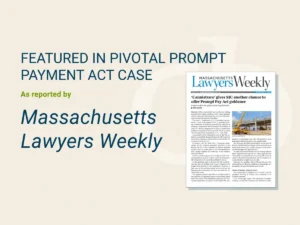Non-Compliance Is Not An Option: Frequently Asked Questions About The Massachusetts Wage Act
Let’s be honest: the Massachusetts Wage Act is unforgiving. However, complaining about the law serves no purpose. Instead, the only way for Massachusetts employers to decrease the risks, headaches, and losses caused by the Wage Act is to understand and comply with the law. Given the strict liability nature of the Wage Act and the extensive damages available to employees, employers should consistently review their wage and hour policies and train managers, supervisors, human resources professionals, and other employees who contribute to the payroll and wage payment process.
This alert addresses some frequently asked questions regarding the Wage Act. However, this is not an exhaustive list, and employers should contact Cole Law Partners’ employment attorneys with specific questions and concerns.
Key Takeaways
- The only defense to Wage Act complaints is compliance with the law. The statute is strict liability with little to no relief for employers who violate the law.
- Violations of the Wage Act carry severe penalties, including mandatory treble damages and attorneys’ fees
- Late payment of wages – even by one day – is considered lost wages and are subject to the same penalties as non-payment of wages
- Payroll procedures and processes must be reviewed regularly.
Frequently Asked Questions
What is a “wage”?
For the purposes of the Wage Act, wages include salary, hourly pay, accrued vacation, holiday pay, and commissions (only if the amount is definitely determined and the commission has become due and payable).
Are discretionary bonuses considered “wages”?
No. A discretionary bonus (e.g., a sign-on bonus dependent upon an employee’s continued employment for a certain period of time or a performance-based bonus) is not a “wage.” If properly categorized, an employer’s failure to pay a discretionary bonus does not subject the employer to liability under the Wage Act.
How do employers distinguish between bonuses and commissions?
There is no specific answer. Employers must create clear bonus and/or commission plans setting forth the conditions that an employee may receive their bonus or commission. These plans, which should be drafted with legal assistance, will define the circumstances surrounding an employee’s receipt of this payment, and those circumstances are the essential elements in distinguishing between a bonus and commission. This process cannot be overlooked.
What are some examples of other forms of payment that are not “wages” under the Wage Act?
Severance payments, sick pay, profit sharing arrangements, and 401(k) matches are additional examples of payments that are not subject to the Wage Act. With this said, employers must carefully review their policies and procedures to ensure they are not making representations that could subject them to the Wage Act.
How often must employers pay wages to employees?
Hourly and salaried employees must be paid weekly or bi-weekly. Typically, they must also receive their pay within six (6) days of the end of the pay period. Hourly employees may never be paid monthly. Salaried employees may be paid monthly only if the employee voluntarily elects to accept monthly payments. These agreements should always be in writing.
Can employers change the frequency of their payroll schedule?
Yes. If an employer wants to change from weekly to bi-weekly pay schedules, the employer may do so. However, prior to making this change, the employer must provide each employee with 90-days advance written notice of the change. Failure to provide this notice may make the change null and may subject the employer to liability under the Wage Act.
May employers implement deferred compensation policies?
No. Under the Wage Act, absolute deferred compensation is another form of late or unpaid wages. At a minimum, employers must pay employees minimum wage. From there, employers and employees can mutually agree to defer compensation. Any deferred compensation agreement should be in writing and signed by all parties.
When must employees be paid upon the end of the employment relationship?
The answer depends on the circumstances. If an employee resigns or leaves employment at their own choosing, then the employer must make final payment of wages no later than the first payroll period after the resignation.
However, if the employer terminates or involuntarily discharges the employee, the employer must make the final payment of wages on the termination date. This means that the employee must have access to and control of the final wages on the termination date. Mailing the payment on the termination date is not sufficient.
What are final wages that must be paid upon separation?
Final wages include all salary / hourly wages earned between the payroll period prior to the separation date and the date of separation (inclusive). They also include all accrued but unused vacation, holiday pay owed to the employee, and due and payable commissions as of the termination.
Is Earned Sick Time owed to an employee at separation?
No. Employers are not obligated to pay for an employee’s accrued but unused sick time at the time of separation. This is why it is important to distinguish vacation from sick leave in your employment policies, and particularly if employers have a combined “Paid Time Off” bucket.
What are the consequences of an employer’s failure to timely pay wages?
If an employer pays an employee late (either as part of payroll or upon separation), does not pay an employee at all, or fails to pay the employee the proper amount, the employer is liable for treble damages (i.e., 3x the wages owed) plus the employee’s attorneys’ fees incurred in collecting their wages. Employers may also be required to pay interest.
What defenses do employers have in response to Wage Act claims?
The answer is “almost none.” The individual must be an “employee” (as opposed to a properly classified independent contractor), and they must have suffered damages. If an employer can establish that the individual was not an “employee” or that the employer did pay the wages properly (i.e., no damages), then the employer may not be liable.
What if an employer’s non-payment was a mistake or only a few days late?
Unfortunately, the Wage Act has no feelings. A good faith mistake still subjects the employer to the same treble damages and attorneys’ fees as an intentional or willful violation. This is true even if the employer’s payroll provider makes the mistake, which is why it is essential for employers to closely review their agreements with third-party payroll providers.
Similarly, if an employer never makes payment of a wage or makes payment 1 day late, the consequences under the Wage Act are the same. Employers must closely scrutinize their payroll processes to avoid these risks.
Who is liable for a Wage Act violation?
Not only is the company liable, but certain executives are also personally liable for violations. Specifically, the president, treasurer, and any officers of a corporation (regardless of corporate form) who manage the corporation “shall” be liable for Wage Act violations.
How long do employees have to bring a Wage Act claim against an employer?
Employees have three years to bring a claim after the alleged violation. With this in mind, employers should maintain comprehensive payroll records during an employee’s employment and for at least 3 years after separation of employment, regardless of the reason.
Does the Wage Act cover aspects of the employment relationship other that payroll?
Yes. Employers are subject to the Wage Act and its penalties with respect to employee vs. independent contractor classification; overtime pay; overtime exempt vs. non-exempt classifications; and Paid Family and Medical Leave (“PFML”) violations.
What should employers do when employees raise concerns regarding payment of wages?
Employers should listen and work closely with the employee. Employers may never retaliate or take adverse employment action against an employee who raises concerns about their wages. The Wage Act prohibits such retaliation and subjects the employer to treble damages for lost wages if the employer terminates the employment relationship because of these types of questions.
Cole Law Partners Can Help
The Wage Act is complex and fraught with risk. Employers must develop, implement, and train on robust payroll policies and procedures. Cole Law Partners’ employment lawyers understand and regularly counsel clients regarding the nuances of the Wage Act, and we are prepared to partner with employers to mitigate risks under the Wage Act and so that employers can focus their attention on their day-to-day business operations. Employers with questions or concerns should contact us to discuss further.




